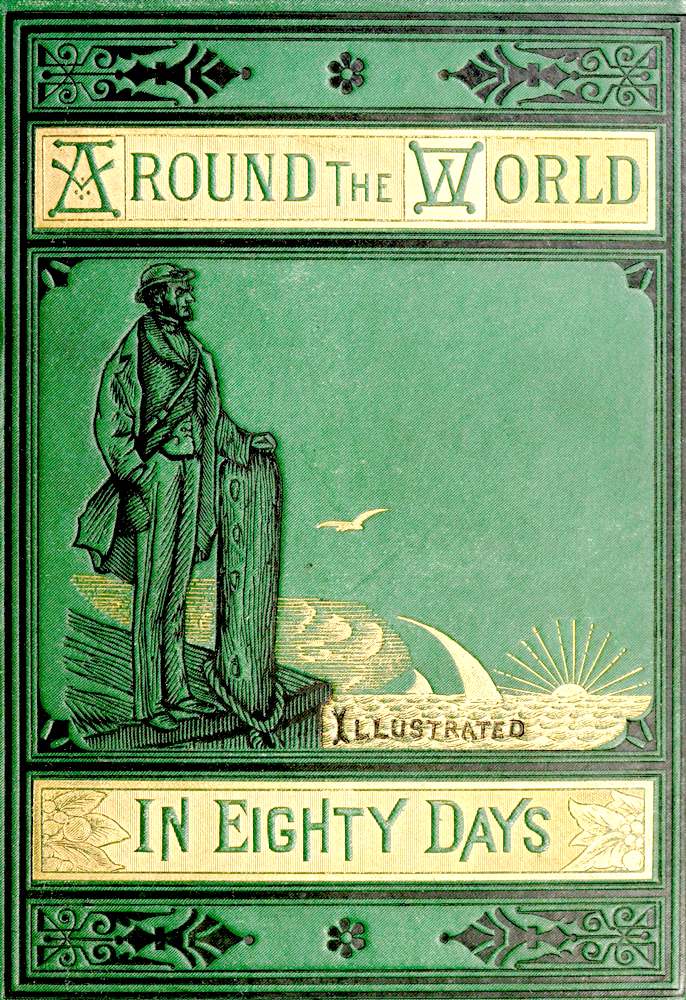|
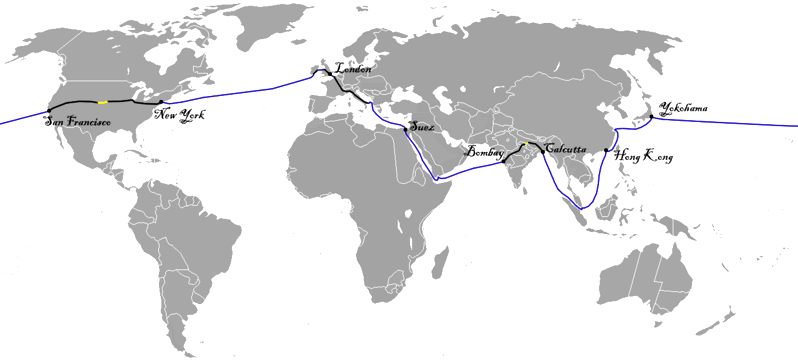
Map
of the route taken by Phileas Fogg, starting in London, then proceeding
east to Suez, Bombay, Calcutta, Hong Kong , Yokohama, San Francisco, New
York, and across the Atlantic
ocean to Ireland, then Liverpool England, and back to London. The route
planner below is for a circumnavigation on water in under 80 days, using
hydrogen, as per the author's prediction in The Mysterious Island. It
would be a major achievement if this was arranged to honor the 150th
anniversary of his publication.
<<<<
CHAPTER XXIX.
IN WHICH CERTAIN INCIDENTS ARE NARRATED WHICH ARE ONLY TO BE MET WITH ON AMERICAN RAILROADS
The train pursued its course, that evening, without interruption, passing Fort Saunders, crossing Cheyne Pass, and reaching Evans Pass. The road here attained the highest elevation of the journey, eight thousand and ninety-two feet above the level of the sea. The travellers had now only to descend to the Atlantic by limitless plains, levelled by nature. A branch of the “grand trunk” led off southward to Denver, the capital of Colorado. The country round about is rich in gold and silver, and more than fifty thousand inhabitants are already settled there.
Thirteen hundred and eighty-two miles had been passed over from San Francisco, in three days and three nights; four days and nights more would probably bring them to New York. Phileas Fogg was not as yet behind-hand.
During the night Camp Walbach was passed on the left; Lodge Pole Creek ran parallel with the road, marking the boundary between the territories of Wyoming and Colorado. They entered Nebraska at eleven, passed near Sedgwick, and touched at Julesburg, on the southern branch of the Platte River.
It was here that the Union Pacific Railroad was inaugurated on the 23rd of October, 1867, by the chief engineer, General Dodge. Two powerful locomotives, carrying nine cars of invited guests, amongst whom was Thomas C. Durant, vice-president of the road, stopped at this point; cheers were given, the Sioux and Pawnees performed an imitation Indian battle, fireworks were let off, and the first number of the Railway Pioneer was printed by a press brought on the train. Thus was celebrated the inauguration of this great railroad, a mighty instrument of progress and civilisation, thrown across the desert, and destined to link together cities and towns which do not yet exist. The whistle of the locomotive, more powerful than Amphion’s lyre, was about to bid them rise from American soil.
Fort McPherson was left behind at eight in the morning, and three hundred and fifty-seven miles had yet to be traversed before reaching Omaha. The road followed the capricious windings of the southern branch of the Platte River, on its left bank. At nine the train stopped at the important town of North Platte, built between the two arms of the river, which rejoin each other around it and form a single artery, a large tributary, whose waters empty into the Missouri a little above Omaha.
The one hundred and first meridian was passed.
Mr. Fogg and his partners had resumed their game; no one—not even the dummy—complained of the length of the trip. Fix had begun by winning several guineas, which he seemed likely to lose; but he showed himself a not less eager whist-player than Mr. Fogg. During the morning, chance distinctly favoured that gentleman. Trumps and honours were showered upon his hands.
Once, having resolved on a bold stroke, he was on the point of playing a spade, when a voice behind him said, “I should play a diamond.”
Mr. Fogg, Aouda, and Fix raised their heads, and beheld Colonel Proctor.
Stamp Proctor and Phileas Fogg recognised each other at once.
“Ah! it’s you, is it, Englishman?” cried the colonel; “it’s you who are going to play a spade!”
“And who plays it,” replied Phileas Fogg coolly, throwing down the ten of spades.
“Well, it pleases me to have it diamonds,” replied Colonel Proctor, in an insolent tone.
He made a movement as if to seize the card which had just been played, adding, “You don’t understand anything about whist.”
“Perhaps I do, as well as another,” said Phileas Fogg, rising.
“You have only to try, son of John Bull,” replied the colonel.
Aouda turned pale, and her blood ran cold. She seized Mr. Fogg’s arm and gently pulled him back. Passepartout was ready to pounce upon the American, who was staring insolently at his opponent. But Fix got up, and, going to Colonel Proctor said, “You forget that it is I with whom you have to deal, sir; for it was I whom you not only insulted, but struck!”
“Mr. Fix,” said Mr. Fogg, “pardon me, but this affair is mine, and mine only. The colonel has again insulted me, by insisting that I should not play a spade, and he shall give me satisfaction for it.”
“When and where you will,” replied the American, “and with whatever weapon you choose.”
Aouda in vain attempted to retain Mr. Fogg; as vainly did the detective endeavour to make the quarrel his. Passepartout wished to throw the colonel out of the window, but a sign from his master checked him. Phileas Fogg left the car, and the American followed him upon the platform. “Sir,” said Mr. Fogg to his adversary, “I am in a great hurry to get back to Europe, and any delay whatever will be greatly to my disadvantage.”
“Well, what’s that to me?” replied Colonel Proctor.
“Sir,” said Mr. Fogg, very politely, “after our meeting at San Francisco, I determined to return to America and find you as soon as I had completed the business which called me to England.”
“Really!”
“Will you appoint a meeting for six months hence?”
“Why not ten years hence?”
“I say six months,” returned Phileas Fogg; “and I shall be at the place of meeting promptly.”
“All this is an evasion,” cried Stamp Proctor. “Now or never!”
“Very good. You are going to New York?”
“No.”
“To Chicago?”
“No.”
“To Omaha?”
“What difference is it to you? Do you know Plum Creek?”
“No,” replied Mr. Fogg.
“It’s the next station. The train will be there in an hour, and will stop there ten minutes. In ten minutes several revolver-shots could be exchanged.”
“Very well,” said Mr. Fogg. “I will stop at Plum Creek.”
“And I guess you’ll stay there too,” added the American insolently.
“Who knows?” replied Mr. Fogg, returning to the car as coolly as usual. He began to reassure Aouda, telling her that blusterers were never to be feared, and begged Fix to be his second at the approaching duel, a request which the detective could not refuse. Mr. Fogg resumed the interrupted game with perfect calmness.
At eleven o’clock the locomotive’s whistle announced that they were approaching Plum Creek station. Mr. Fogg rose, and, followed by Fix, went out upon the platform. Passepartout accompanied him, carrying a pair of revolvers. Aouda remained in the car, as pale as death.
The door of the next car opened, and Colonel Proctor appeared on the platform, attended by a Yankee of his own stamp as his second. But just as the combatants were about to step from the train, the conductor hurried up, and shouted, “You can’t get off, gentlemen!”
“Why not?” asked the colonel.
“We are twenty minutes late, and we shall not stop.”
“But I am going to fight a duel with this gentleman.”
“I am sorry,” said the conductor; “but we shall be off at once. There’s the bell ringing now.”
The train started.
“I’m really very sorry, gentlemen,” said the conductor. “Under any other circumstances I should have been happy to oblige you. But, after all, as you have not had time to fight here, why not fight as we go along?”
“That wouldn’t be convenient, perhaps, for this gentleman,” said the colonel, in a jeering tone.
“It would be perfectly so,” replied Phileas Fogg.
“Well, we are really in America,” thought Passepartout, “and the conductor is a gentleman of the first order!”
So muttering, he followed his master.
The two combatants, their seconds, and the conductor passed through the cars to the rear of the train. The last car was only occupied by a dozen passengers, whom the conductor politely asked if they would not be so kind as to leave it vacant for a few moments, as two gentlemen had an affair of honour to settle. The passengers granted the request with alacrity, and straightway disappeared on the platform.
The car, which was some fifty feet long, was very convenient for their purpose. The adversaries might march on each other in the aisle, and fire at their ease. Never was a duel more easily arranged. Mr. Fogg and Colonel Proctor, each provided with two six-barrelled revolvers, entered the car. The seconds, remaining outside, shut them in. They were to begin firing at the first whistle of the locomotive. After an interval of two minutes, what remained of the two gentlemen would be taken from the car.
Nothing could be more simple. Indeed, it was all so simple that Fix and Passepartout felt their hearts beating as if they would crack. They were listening for the whistle agreed upon, when suddenly savage cries resounded in the air, accompanied by reports which certainly did not issue from the car where the duellists were. The reports continued in front and the whole length of the train. Cries of terror proceeded from the interior of the cars.
Colonel Proctor and Mr. Fogg, revolvers in hand, hastily quitted their prison, and rushed forward where the noise was most clamorous. They then perceived that the train was attacked by a band of Sioux.
This was not the first attempt of these daring Indians, for more than once they had waylaid trains on the road. A hundred of them had, according to their habit, jumped upon the steps without stopping the train, with the ease of a clown mounting a horse at full gallop.
The Sioux were armed with guns, from which came the reports, to which the passengers, who were almost all armed, responded by revolver-shots.
The Indians had first mounted the engine, and half stunned the engineer and stoker with blows from their muskets. A Sioux chief, wishing to stop the train, but not knowing how to work the regulator, had opened wide instead of closing the steam-valve, and the locomotive was plunging forward with terrific velocity.
The Sioux had at the same time invaded the cars, skipping like enraged monkeys over the roofs, thrusting open the doors, and fighting hand to hand with the passengers. Penetrating the baggage-car, they pillaged it, throwing the trunks out of the train. The cries and shots were constant. The travellers defended themselves bravely; some of the cars were barricaded, and sustained a siege, like moving forts, carried along at a speed of a hundred miles an hour.
Aouda behaved courageously from the first. She defended herself like a true heroine with a revolver, which she shot through the broken windows whenever a savage made his appearance. Twenty Sioux had fallen mortally wounded to the ground, and the wheels crushed those who fell upon the rails as if they had been worms. Several passengers, shot or stunned, lay on the seats.
It was necessary to put an end to the struggle, which had lasted for ten minutes, and which would result in the triumph of the Sioux if the train was not stopped. Fort Kearney station, where there was a garrison, was only two miles distant; but, that once passed, the Sioux would be masters of the train between Fort Kearney and the station beyond.
The conductor was fighting beside Mr. Fogg, when he was shot and fell. At the same moment he cried, “Unless the train is stopped in five minutes, we are lost!”
“It shall be stopped,” said Phileas Fogg, preparing to rush from the car.
“Stay, monsieur,” cried Passepartout; “I will go.”
Mr. Fogg had not time to stop the brave fellow, who, opening a door unperceived by the Indians, succeeded in slipping under the car; and while the struggle continued and the balls whizzed across each other over his head, he made use of his old acrobatic experience, and with amazing agility worked his way under the cars, holding on to the chains, aiding himself by the brakes and edges of the sashes, creeping from one car to another with marvellous skill, and thus gaining the forward end of the train.
There, suspended by one hand between the baggage-car and the tender, with the other he loosened the safety chains; but, owing to the traction, he would never have succeeded in unscrewing the yoking-bar, had not a violent concussion jolted this bar out. The train, now detached from the engine, remained a little behind, whilst the locomotive rushed forward with increased speed.
Carried on by the force already acquired, the train still moved for several minutes; but the brakes were worked and at last they stopped, less than a hundred feet from Kearney station.
The soldiers of the fort, attracted by the shots, hurried up; the Sioux had not expected them, and decamped in a body before the train entirely stopped.
But when the passengers counted each other on the station platform several were found missing; among others the courageous Frenchman, whose devotion had just saved them.
NEXT
>>>>
CHAPTERS
1. - I. IN WHICH PHILEAS FOGG AND PASSEPARTOUT ACCEPT EACH OTHER, THE ONE AS
MASTER AND AS MAN
2. - II. IN WHICH PASSEPARTOUT IS CONVINCED THAT HE HAS AT LAST FOUND HIS IDEAL
3. - III. IN WHICH A CONVERSATION TAKES PLACE WHICH SEEMS LIKELY TO COST PHILEAS FOGG DEAR
4. - IV. IN WHICH PHILEAS FOGG ASTOUNDS
PASSEPARTOUT, HIS SERVANT
5. - V. IN WHICH A NEW SPECIES OF FUNDS, UNKNOWN TO THE MONEYED MEN, APPEARS ON ’CHANGE
6. - VI. IN WHICH FIX, THE DETECTIVE, BETRAYS A VERY NATURAL IMPATIENCE
7. - VII. WHICH ONCE MORE DEMONSTRATES THE USELESSNESS OF PASSPORTS AS AIDS TO DETECTIVES
8. - VIII. IN WHICH PASSEPARTOUT TALKS RATHER MORE, PERHAPS, THAN IS PRUDENT
9. - IX. IN WHICH THE RED SEA AND THE INDIAN OCEAN PROVE PROPITIOUS TO THE DESIGNS OF PHILEAS FOGG
10. - X. IN WHICH PASSEPARTOUT IS ONLY TOO GLAD TO GET OFF WITH THE LOSS OF HIS SHOES
11. - XI. IN WHICH PHILEAS FOGG SECURES A CURIOUS MEANS OF CONVEYANCE AT A FABULOUS PRICE
12. - XII. IN WHICH PHILEAS FOGG AND HIS COMPANIONS VENTURE ACROSS THE INDIAN FORESTS, AND WHAT ENSUED
13. - XIII. IN WHICH PASSEPARTOUT RECEIVES A NEW PROOF THAT FORTUNE FAVORS THE BRAVE
14. - XIV. FOGG DESCENDS THE LENGTH OF THE BEAUTIFUL VALLEY OF THE GANGES WITHOUT EVER THINKING OF SEEING IT
15. - XV. IN WHICH THE BAG OF BANKNOTES DISGORGES SOME THOUSANDS OF POUNDS MORE
16. - XVI. IN WHICH FIX DOES NOT SEEM TO UNDERSTAND IN THE LEAST WHAT IS SAID TO HIM
17. - XVII. SHOWING WHAT HAPPENED ON THE VOYAGE FROM SINGAPORE TO HONG KONG
18. - XVIII. IN WHICH PHILEAS FOGG, PASSEPARTOUT, AND FIX GO EACH ABOUT HIS BUSINESS
19. - XIX. IN WHICH PASSEPARTOUT TAKES A TOO GREAT INTEREST IN HIS MASTER, AND WHAT COMES OF IT
20. - XX. IN WHICH FIX COMES FACE TO FACE WITH PHILEAS FOGG
21. - XXI. IN WHICH THE MASTER OF THE “TANKADERE” RUNS GREAT RISK OF LOSING A REWARD OF TWO HUNDRED POUNDS
22. - XXII. PASSEPARTOUT DISCOVERS IT IS CONVENIENT TO HAVE MONEY IN ONE’S POCKET
AT THE ANTIPODES
23. - XXIII. IN WHICH PASSEPARTOUT’S NOSE BECOMES OUTRAGEOUSLY LONG
24. - XXIV. DURING WHICH MR. FOGG AND PARTY CROSS THE PACIFIC OCEAN
25. - XXV. IN WHICH A SLIGHT GLIMPSE IS HAD OF SAN FRANCISCO
26. - XXVI. IN WHICH PHILEAS FOGG AND PARTY TRAVEL BY THE PACIFIC RAILROAD
27. - XXVII. IN WHICH PASSEPARTOUT UNDERGOES, AT A SPEED OF 20 MPH, A COURSE OF MORMON HISTORY
28. - XXVIII. IN WHICH PASSEPARTOUT DOES NOT SUCCEED IN MAKING ANYBODY LISTEN TO REASON
29. - XXIX. IN WHICH CERTAIN INCIDENTS ARE NARRATED WHICH ARE ONLY TO BE MET WITH ON AMERICAN RAILROADS
30. - XXX. IN WHICH PHILEAS FOGG SIMPLY DOES HIS DUTY
31. - XXXI. IN WHICH FIX, THE DETECTIVE, CONSIDERABLY FURTHERS THE INTERESTS OF PHILEAS FOGG
32. - XXXII. IN WHICH PHILEAS FOGG ENGAGES IN A DIRECT STRUGGLE WITH BAD FORTUNE
33. - XXXIII. IN WHICH PHILEAS FOGG SHOWS HIMSELF EQUAL TO THE OCCASION
34. - XXXIV. IN WHICH PHILEAS FOGG AT LAST REACHES LONDON
35. - XXXV. IN WHICH PHILEAS FOGG DOES NOT HAVE TO REPEAT HIS ORDERS TO PASSEPARTOUT TWICE
36. - XXXVI. IN WHICH PHILEAS FOGG’S NAME IS ONCE MORE AT A PREMIUM ON ’CHANGE
37. - XXXVII. PHILEAS FOGG FINDS HE GAINED NOTHING BY HIS TOUR AROUND THE WORLD, UNLESS IT WERE HAPPINESS
PLOT
- AROUND
THE WORLD IN EIGHTY DAYS
The story starts in London on October 2, 1872. Phileas Fogg is a wealthy, solitary, unmarried gentleman with regular habits. The source of his wealth is not known and he lives modestly. He fires his former valet, James Forster, for bringing him shaving
water two degrees too cold. He hires as a replacement
Passepartout, a Frenchman of around 30 years of age.
Later that day in the Reform Club, he gets involved in an argument over an article in
The Daily
Telegraph, stating that with the opening of a new railway section in India, it is now possible to travel around the world in 80 days.
Fogg accepts a wager for £20,000 from his fellow club members, which he will receive if he makes it around the world in 80 days. Accompanied by his manservant
Passepartout, he leaves London by train at 8.45 p.m. on October 2, 1872, and thus is due back at the Reform Club at the same time 80 days later, on December 21.
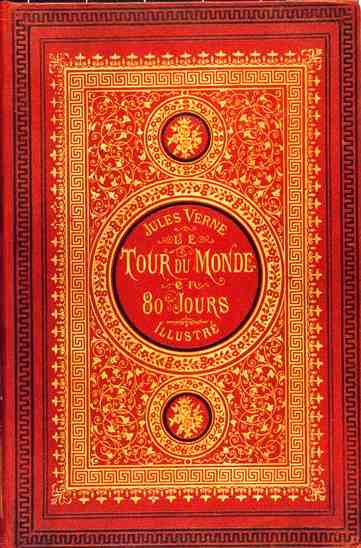

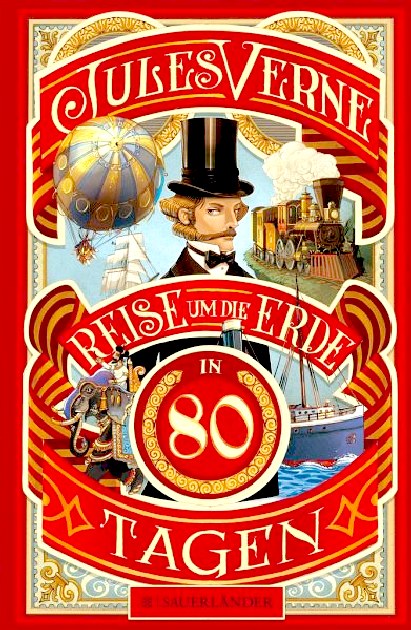
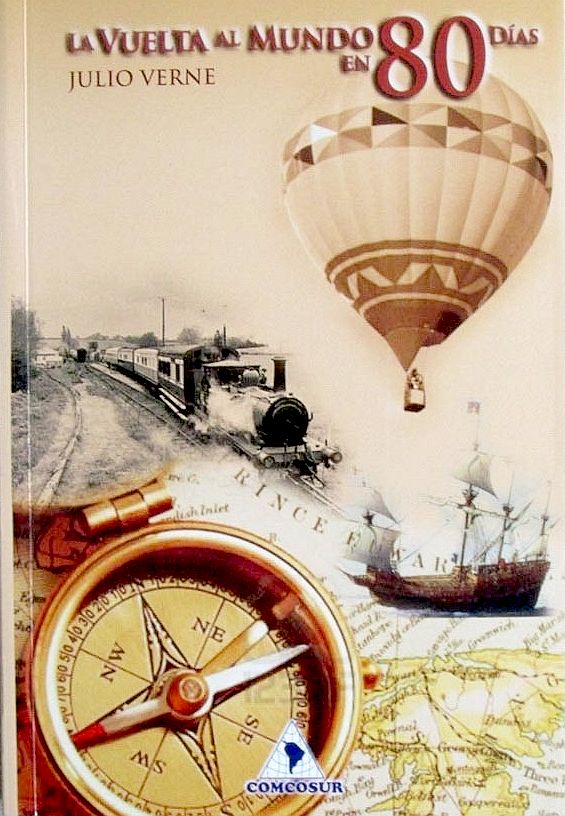
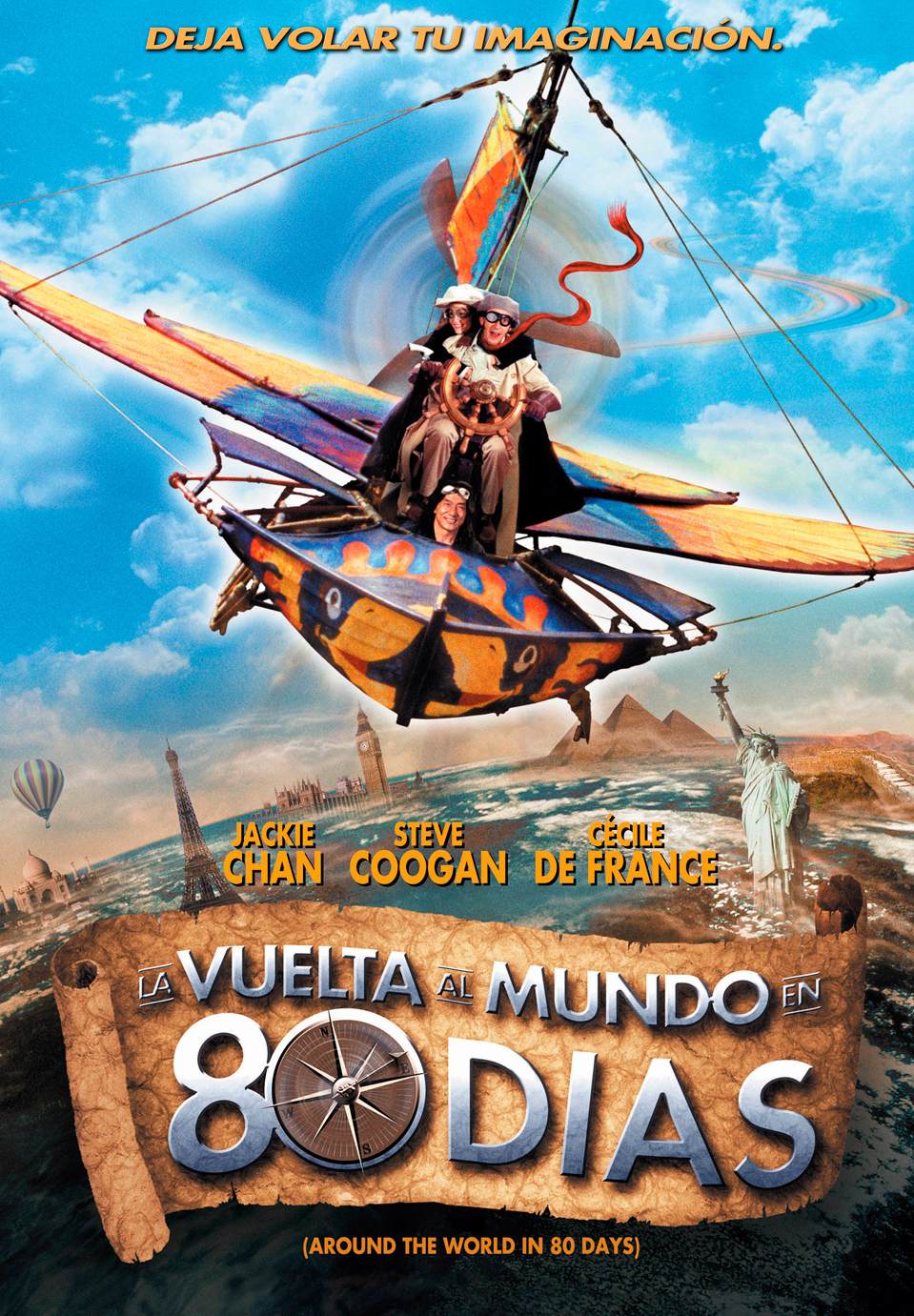
Many
of his stories today seem a little tame, as technology has caught up
with the imagination of the extraordinary French author, and Hollywood
has discovered Computer Generated Images (CGI) allowing super heroes to
grace our screens as never before. Computers are one thing that Verne
did not imagine or seek to portray.
Beginning in late 1872, the serialized version of Verne's famed Around the World in Eighty Days (Le Tour du monde en quatre-vingts jours) first appeared in print. The story of Phileas Fogg and Jean Passepartout takes readers on an adventurous global tour at a time when travel was becoming easier and alluring. In the century plus since its original debut, the work has been adapted for the theater, radio, television and film, including the classic 1956 version starring David
Niven. The TV series starring Pierce Brosnan released in 1989, runs for around 6 hours on
2 DVDs. A BBC
TV travel documentary starring Michael Palin, was also screened in
1989. A second TV series starring David Tennant was produced by the
BBC for 2021.
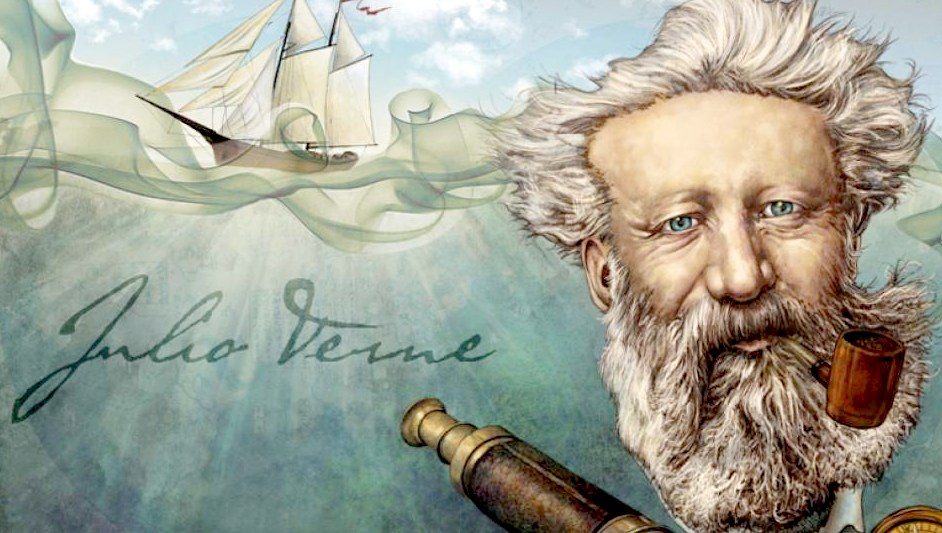
Jules
Verne is known as the Father of Science Fiction
Where
Jules Verne's suggested that it might be possible to travel
Around The
World In 80 Days, we would like to extend that ethos to include
traveling in a Zero
Emission yacht (ZEWT or ZEV) driven by electric
hydro-jets? With the advent of solar power, liquid hydrogen, methanol
reformers, and fuel
cells - we'll wager that it is a distinct possibility - on a scale of the
stake that the legendary Philleas Fogg entered into at the Reform Club in
1872. Now there's a challenge for you. Place your bets!
|







